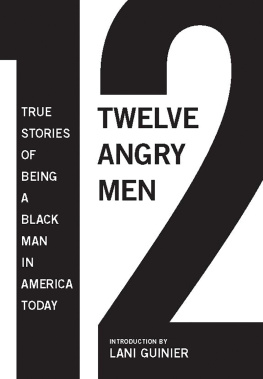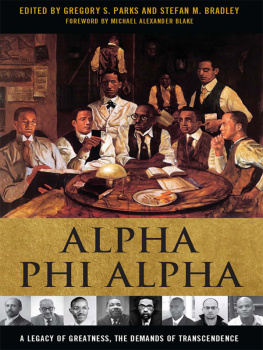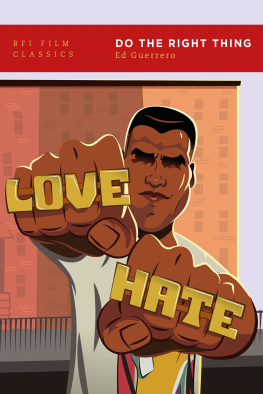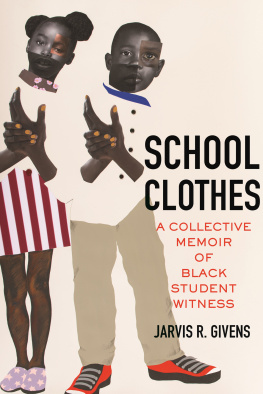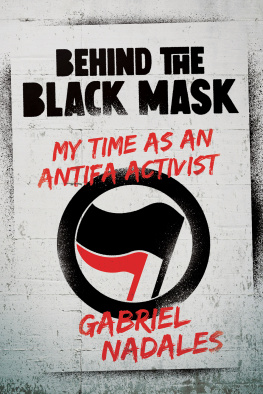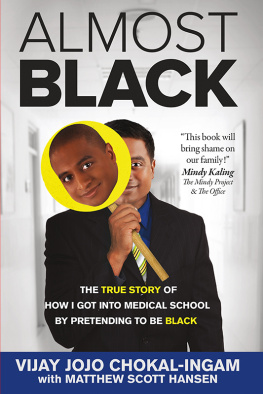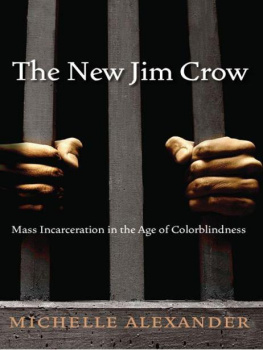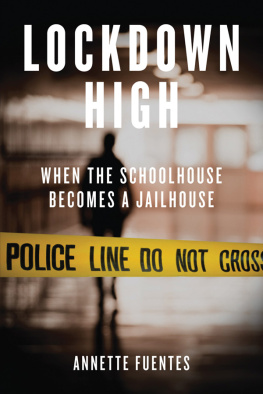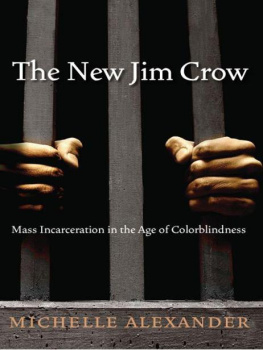Pagebreaks of the print version

12 ANGRY MEN
TRUE STORIES OF BEING A BLACK MAN IN AMERICA TODAY
EDITED BY
GREGORY S. PARKS AND MATTHEW W. HUGHEY
WITH AN INTRODUCTION BY
LANI GUINIER
2010 by The New Press
All rights reserved.
No part of this book may be reproduced, in any form, without written permission from the publisher.
Requests for permission to reproduce selections from this book should be mailed to: Permissions Department, The New Press, 38 Greene Street, New York, NY, 10013.
Part of chapter 3 is excerpted from Joe Morgan: A Life in Baseball by Joe Morgan and David Falkner (1993) and is reprinted with the permission of W.W. Norton & Company, Inc.
Chapter 11 is excerpted from Its Bigger Than Hip-Hop by M.K. Asante Jr. (2008) and is reprinted with the permission of St. Martins Press.
Published in the United States by The New Press, New York, 2010 Distributed by Perseus Distribution
LIBRARY OF CONGRESS CATALOGING-IN-PUBLICATION DATA
12 angry men: true stories of being a black man in America today / edited by Gregory S. Parks and Matthew W. Hughey.
p. cm.
Includes bibliographical references.
ISBN 978-1-59558-538-7 (hc. : alk. paper) 1. African American men--Attitudes--History--21st century. 2. Racial profiling in law enforcement--United States. 3. United States--Race relations. 4. African Americans--Social conditions--21st century. 5. Racism--United States. I. Parks, Gregory, 1974- II. Hughey, Matthew W. (Matthew Windust) III. Title: Twelve angry men.
E185.615.A12 2010
305.896'07300922--dc22
2010032244
The New Press was established in 1990 as a not-for-profit alternative to the large, commercial publishing houses currently dominating the book publishing industry. The New Press operates in the public interest rather than for private gain, and is committed to publishing, in innovative ways, works of educational, cultural, and community value that are often deemed insufficiently profitable.
www.thenewpress.com
Composition by The Influx House
This book was set in Galliard
To the memory of Oscar Grant, Sean Bell,
Amadou Diallo, and the countless brothers who have
lost their lives, and dignity, to racial profiling
INTRODUCTION:
FROM RACIAL PROFILING TO RACIAL LITERACY: LESSONS OF 12 ANGRY MEN
L ANI G UINIER
The phrase Twelve Angry Men is rife with current meaning. Film buffs will remember that, in the Sidney Lumet classic, ethnic bias figured starkly in the all-white jurys initial, knee-jerk conclusion of guilt. Anger animated the other jurors reaction when Henry Fondas character used doubt and reason to resist their prejudice. This black-and-white depiction of America certainly still resonates.
Now, nearly six decades later, the tables have been turned: the men who are angry in this 12 Angry Men are the accused themselvesthe stopped-and-frisked, the unlawfully detained, the racially profiled. These mens accounts of their interactions with the police are cinematic in their clarity and pathos. Their anger is understandable, justifiable. It stems from an often arbitrary, sometimes violent moment of encounter with personified state power, with its attendant embarrassment, helplessness, and fear. That anger also reflects the long chain of confrontation in this country between institutionalized state power and the individual, particularly the individual of color.
In this book are the actual voices of African American men across a spectrum of society, decrying the ugly, thoughtless, terrifying rejection of their individuality, the spasmodic yet ancient focus of authority on one all-too-frequently-invoked presumption: you are black, so the burden is on you to prove that you are not dangerous. As baseball great Joe Morgan relates in his account of being racially profiled by a member of the LAPD at the Los Angeles airport, even celebrity is no exception to what we can consider the inverse of color blindness.
Racial profiling is a reality that we often dont hear mentioned in the Obama era, because liberal and conservative pundits alike tell us that we now live in a post-racial America. Or we are cautioned that to speak up about race is itself an act of racism. Thus, the gripping racial profiling stories of twelve black men represent an important rejoinder to contemporary post-racial admonitions. Their stories are eloquent reminders that race, as in racial profiling, still matters.
According to the ACLU, racial profiling is the use of race by law enforcement in any fashion and to any degree when making decisions about whom to stop, interrogate, search, or arrestexcept where there is a specific suspect description that includes the suspects race. This is the technical definition, focused on law enforcement excesses. In its daily manifestations, racial profiling by law enforcement provides a pattern of situations and locations and a standard cast of characters that are as predictable as a Christmas pageant: police officers stop young men of color for walking-while-black, driving-while-black, flying-while-black, and, in the case of New York Times reporter Solomon Moore, even reporting-while-black. Black men are not the only objects of racial profiling, but they are the most profiled group in the country.
The contributors to 12 Angry Men tell firsthand stories representative of each of these forms of profiling. Congressman Daniel K. Davis and the young artist and professor M.K. Asante tell of being behind the wheel of a car pulled over by the police and subjected to a degrading kind of treatment, based on a presumption of guilt that few white Americans ever experience. The former head of the ACLUs racial profiling division, who was himself profiled at Bostons Logan Airport coming home from a racial profiling conference, describes how airports are also fertile ground for this pernicious practice (and increasingly for the profiling of black women suspected of drug couriering). Leaving a bar or a club is also a defining moment for police encounters, according to Bryonn Bain, my former student at Harvard Law School, and aspiring hip-hop artist Joshua T. Wiley, a native of Asheville, North Carolina, both of whom recount their experiences here.
Evidently, for many young black men all that matters is the color of their skin, regardless of the place or time, as Nii-Odoi Glover, an event marketer in Los Angeles, makes painfully clear. When he was a teenager in Washington, D.C., Glover recounts:
the cops would stop me and my friends and verbally harass us about where we were going and what we were doingall under the pretense that they were looking for someone that fits your description. This was the socialization that we went through. Even though we came from diverse backgrounds, were of various ages, and had various levels of education, we were all stopped and harassed regularly by the cops.
Then, in his twenties, driving to and from work, Glover was pulled over repeatedly:
I got stopped at least once a month, sometimes three times a month. My roommate at the time was aware of the situation and understood that if he was to ride anywhere with me, then we had to plan to leave early enough to account for the time spent if we were to be stopped. We would try to make a joke out of it: Here come your boys! he would say when cops behind us would turn on their sirens.
And now, as a grown man and a father, Glover draws police attention for reading a book in the playground while supervising his daughter at play: [The police] told me that someone called them and told them that a black man was in the park watching kids.

